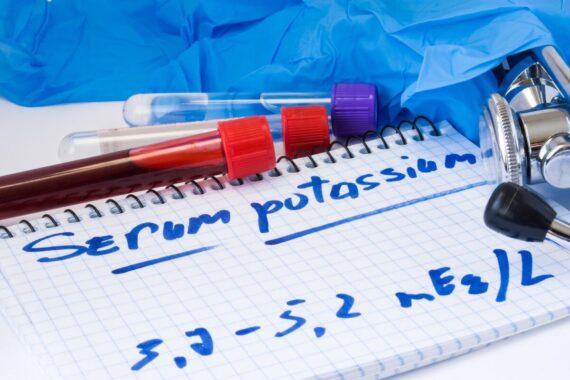Updated guidance on managing hyperkalaemia has caused some debate after recommending that patients with moderately high potassium levels can be looked after in the community, as long as they are not acutely ill or do not have acute kidney injury.
Under the revised recommendations from the UK Kidney Association (UKKA), if a patient has a moderate potassium level of 6.0-6.4mmol/L they can be reviewed without admission to hospital.
‘Most cases of mild or moderate hyperkalaemia detected in the community can be managed without the need for hospital admission unless acutely unwell,’ the 170-page guideline says.
The guidelines recommended that the serum potassium is repeated within one day of an episode of moderate hyperkalaemia (K+ 6.0 – 6.4 mmol/l) when detected in the community.
They state that around 20% of patients with moderate-severe CKD develop hyperkalaemia and many have recurrent episodes.
And they add that patients with moderate levels of hyperkalaemia ‘pose the greatest dilemma’, especially when acuity is low, but warrant intervention to avoid deterioration
But while GPs said they welcomed guidance in this area, it prompted questions about what was meant by ‘community’ and whether it was safe to manage this group of patients in primary care without easy access to tests.
Dr Selvaseelan Selvarajah, a GP in East London, also asked whether a GP had been involved in the guidance. ‘Rapid blood test and ECG aren’t feasible in most GP settings including in out of hours GP services. Many don’t have the infrastructure or funding to deliver same day [results].’
Dr Jonathan Leach, a GP in Bromsgrove said: ‘The guidelines clearly represent significant work and especially trying to streamline the assessment and process and management of patients with high potassium levels.
‘However, they are written from a secondary care perspective and especially where access to blood investigations in general practice can take 24 hours or more, even for urgent blood tests.
‘I think it would be helpful if the guidelines could take into account the different context of general practice as in broad terms my experience is that if potassium is moderate or above, the patient is better being seen where blood tests and ECGs can be rapidly undertaken which is usually in a hospital type of setting.’
In response to social media queries about whether this approach was feasible for GPs, Dr Jamie Willows, a renal consultant at Sunderland Royal Hospital, said the guideline would help teams manage some people in the outpatient setting.
‘In my opinion the authors aren’t advocating trying to manage outpatient hyperkalaemia without adequate resource and would fully accept that vast majority of GPs can’t rapidly repeat bloods.’
Speaking about the issue with Pulse, guideline author Dr Annette Alfonzo said the community section of the guidelines ‘refers to the outpatient setting’.
‘This includes both primary care and outpatient clinics.’
She added: ‘Phlebotomy hubs can improve access for blood testing, but still relies on timely review of the results.’
Dr Alfonzo noted that local protocols would vary depending on staffing and training but that a ‘pragmatic approach’ was needed that may also involve virtual wards in some situations.


















READERS' COMMENTS [2]
Please note, only GPs are permitted to add comments to articles
The current wait for a blood test locally is around 3 weeks.
We could of course do it ourselves, but we’re not commissioned or paid for this and would effectively be paying out of our own pockets for one of our nurses to do this.
Who writes these protocols?
Ah, ‘outpatients’ does not include ‘GP patients’, only those managed entirely by hospital teams, so all GP has to do is, if serum potassium is above the upper limit for local lab, refer them to hospital, by telling patient/relative to call ambulance if unwell, and by car if not unwell and below 6. (presumably to renal or A&E if nearer, so that is A&E for all of ours.